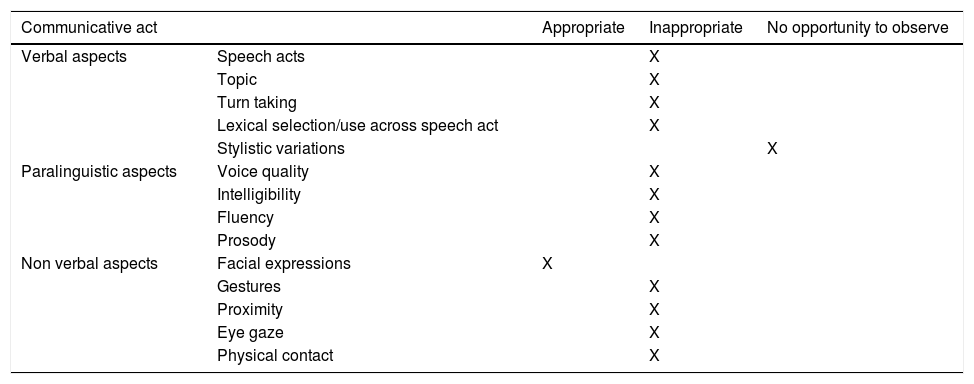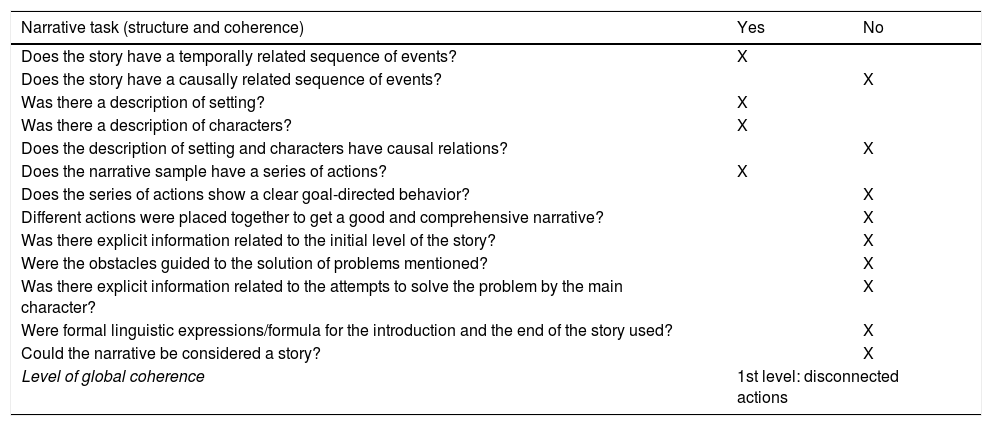Smith–Magenis syndrome (SMS) is a rare neurodevelopmental disorder with mild-to-moderate intellectual disability. Speech and language impairments have not been well described as part of the SMS phenotype. This study reports the speech and language characteristics presented by a classical SMS case, a 20-year-old woman with positive deletion in the region 17p11.2. The case presented a borderline IQ on verbal and performance Wechsler scales. Language standardized tests (i.e., Peabody, Token test, CEG test and Boehm test) and naturalistic language sample (i.e. conversation and story generation) were used to assess speech and language performance. Speech characteristics included imprecise speech, with a high speech rate, hoarse voice, hypernasality and intelligibility deficits. The performance in all standardized tests was poor. Socio-communicative deficits included repetitive and persistent verbal behavior, difficulties in the use of linguistic strategies to repair communication breakdowns, limited vocabulary production and short overall length utterances with reduced grammatical components. The results contribute to expanding knowledge about the SMS phenotype, also to highlight the need to include speech and language evaluation as part of the clinical assessment of SMS and, at the same time, to draw attention to the need to include early communications skills in language intervention programs.
El síndrome de Smith-Magenis (SMS) es un trastorno neuroevolutivo frecuente, que se caracteriza por la discapacidad intelectual de leve a moderada. Los trastornos del habla y del lenguaje no han sido bien descritos como parte del fenotipo del SMS. Este estudio reporta las características del habla y del lenguaje presentadas por un caso clásico de SMS, una mujer de 20 años de edad con deleción positiva en la región 17p11.2. El caso presentó un CI límite en las escalas verbales y de desempeño de Wechsler. Se utilizaron pruebas estandarizadas del lenguaje (pruebas de Peabody, Token, CEG y Boehm) y una muestra de lenguaje naturalista (es decir, conversación y generación de historias) para evaluar el desempeño del habla y del lenguaje. Las características del habla incluyeron imprecisiones, con una alta tasa de habla, voz ronca, hipernasalidad y déficits de inteligibilidad. Su desempeño fue malo en todas las pruebas estandarizadas. Los déficits socio-comunicativos incluyeron comportamiento verbal repetitivo y persistente, dificultades en el uso de estrategias lingüísticas para reparar los fallos de comunicación, producción de vocabulario limitado y longitudes de expresión cortas en general, con reducción de los componentes gramaticales. Los resultados ayudan a expandir el conocimiento sobre el fenotipo SMS, y también subrayan la necesidad de incluir la evaluación del habla y del lenguaje como parte de la evaluación clínica del SMS, y al mismo tiempo, atraer la atención sobre la necesidad de incluir competencias de comunicación temprana en los programas de intervención del lenguaje.













